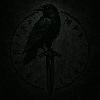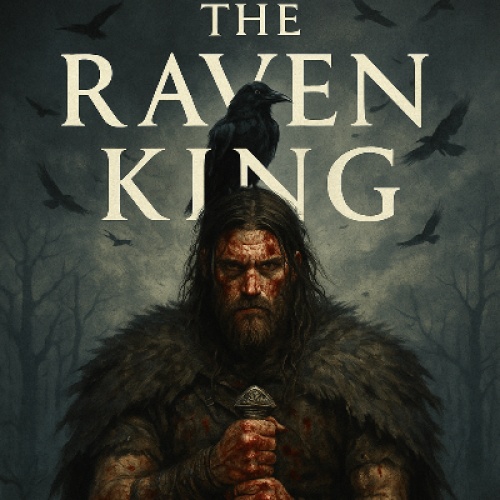In the far North, where winter clutches the earth in an iron grip and the sun forgets to rise, the village of Skardheim clung to the edge of the mountains like a rotting tooth. It was here that Eirik, son of Ulv, was born - child of a once-revered warrior and a woman of sei�r, whose bloodline whispered to the roots of Yggdrasil itself.
At thirteen winters old, Eirik witnessed his father's death - not in glory, not with sword in hand - but slain from behind at the thingstead, before the gathered clan. The killer was Jarl Hrovar the Silent, a cold and power-hungry chieftain who accused Ulv of treason and witchcraft. The crowd said nothing. They watched. Some turned away. None intervened.
A Blood Oath in the Dark
Four years passed. Eirik grew - not as the others did, but with silence in his bones and shadows in his eyes. He would vanish into the forest for days, returning with claw marks on his arms and ravens perched on his shoulders. The people called him cursed. They were not wrong.
At sixteen, his mother died. Eirik lit her funeral pyre with hands that did not tremble. He did not weep. Instead, he made a vow to the dark:
"You will have your vengeance, Father. And you will have your rest, Mother."
From beneath the forest floor, he unearthed his father's buried sword: Bl��rim - Blood-Frost, forged in the old ways, with runes that glowed faintly when touched by breath. And then he walked into the woods, beyond the sight of men, to the ancient bl�t grove, where bones still hung from the trees like forgotten prayers.
There, under the moonless sky, he cut his palm and bled into the earth.
"Odin. Hel. Whoever hears me - grant me the strength to unmake him."
And something heard.
The First Night
The first to die were Hrovar's three wolves - his loyal killers. They were found in the woods, hanging upside down, their skin peeled back, runes carved into their chests:
"Traitor. Follower. Fallen."
The village whispered. Some said Eirik had returned as a spirit. Others claimed he had entered the forest as a boy and emerged as something else - neither god nor beast, but a servant of both.
The Battle of Gammelbr�ten
When Eirik reached his eighteenth winter, he returned to Skardheim - not alone, but leading twelve outcasts. Witches. Sei�r-practitioners. Berserkers with ash-streaked faces and blades filed to points. They wore no armor. They carried no banners. But behind them flew hundreds of ravens - black clouds that circled above like omens.
Jarl Hrovar mocked the news. "Children playing at war," he said, and sent thirty men to crush them at the river crossing.
But what met his warriors was not an army.
It was a reckoning.
Eirik walked at the front, bare-chested, eyes black as obsidian, lips sealed in grim silence. In his hand, Bl��rim hummed.
He raised the sword once.
And then the slaughter began.
His blade sang through shield and bone. He moved not like a man, but like a story told in the dark. His followers fell upon the jarl's warriors like wolves upon deer - ripping, screaming, shrieking as though the gods themselves had lent them rage.
One man tried to strike Eirik from behind, only to find his hand split in two before the blow landed. Eirik turned and, with a snarl, drove his blade from shoulder to hip, tearing the man open in a red blossom of steam and pain.
The battle ended in minutes.
Few survived. None who did spoke again.
The Final Night
Eirik entered Hrovar's longhouse alone.
There were no guards. No resistance. Only the jarl, slumped over a drinking horn, the smell of mead and fear thick in the air.
"You were just a boy," Hrovar said, staring into the fire.
"A boy with dreams."
"And you," Eirik replied, "are a man who has forgotten."
He did not use Bl��rim.
He used an axe.
And he took his time.
They say the blood soaked the floorboards and spilled out into the snow. Some claimed they heard chanting. Others swore they saw ravens watching through the thatch, eyes gleaming like coals.
The Name That Remains
After that night, no one called him Eirik.
They called him The Raven King - Krakkakonungr, the one who walks with the dead, who speaks to Odin, who cannot die until every debt is paid.
Some say he still walks the forests, speaking to wolves and birds. Others say he passed into Hel's hall, laughing, axe in hand.
But all know this:
If you hear ravens in the night, do not look up.
For he has already seen you.
At thirteen winters old, Eirik witnessed his father's death - not in glory, not with sword in hand - but slain from behind at the thingstead, before the gathered clan. The killer was Jarl Hrovar the Silent, a cold and power-hungry chieftain who accused Ulv of treason and witchcraft. The crowd said nothing. They watched. Some turned away. None intervened.
A Blood Oath in the Dark
Four years passed. Eirik grew - not as the others did, but with silence in his bones and shadows in his eyes. He would vanish into the forest for days, returning with claw marks on his arms and ravens perched on his shoulders. The people called him cursed. They were not wrong.
At sixteen, his mother died. Eirik lit her funeral pyre with hands that did not tremble. He did not weep. Instead, he made a vow to the dark:
"You will have your vengeance, Father. And you will have your rest, Mother."
From beneath the forest floor, he unearthed his father's buried sword: Bl��rim - Blood-Frost, forged in the old ways, with runes that glowed faintly when touched by breath. And then he walked into the woods, beyond the sight of men, to the ancient bl�t grove, where bones still hung from the trees like forgotten prayers.
There, under the moonless sky, he cut his palm and bled into the earth.
"Odin. Hel. Whoever hears me - grant me the strength to unmake him."
And something heard.
The First Night
The first to die were Hrovar's three wolves - his loyal killers. They were found in the woods, hanging upside down, their skin peeled back, runes carved into their chests:
"Traitor. Follower. Fallen."
The village whispered. Some said Eirik had returned as a spirit. Others claimed he had entered the forest as a boy and emerged as something else - neither god nor beast, but a servant of both.
The Battle of Gammelbr�ten
When Eirik reached his eighteenth winter, he returned to Skardheim - not alone, but leading twelve outcasts. Witches. Sei�r-practitioners. Berserkers with ash-streaked faces and blades filed to points. They wore no armor. They carried no banners. But behind them flew hundreds of ravens - black clouds that circled above like omens.
Jarl Hrovar mocked the news. "Children playing at war," he said, and sent thirty men to crush them at the river crossing.
But what met his warriors was not an army.
It was a reckoning.
Eirik walked at the front, bare-chested, eyes black as obsidian, lips sealed in grim silence. In his hand, Bl��rim hummed.
He raised the sword once.
And then the slaughter began.
His blade sang through shield and bone. He moved not like a man, but like a story told in the dark. His followers fell upon the jarl's warriors like wolves upon deer - ripping, screaming, shrieking as though the gods themselves had lent them rage.
One man tried to strike Eirik from behind, only to find his hand split in two before the blow landed. Eirik turned and, with a snarl, drove his blade from shoulder to hip, tearing the man open in a red blossom of steam and pain.
The battle ended in minutes.
Few survived. None who did spoke again.
The Final Night
Eirik entered Hrovar's longhouse alone.
There were no guards. No resistance. Only the jarl, slumped over a drinking horn, the smell of mead and fear thick in the air.
"You were just a boy," Hrovar said, staring into the fire.
"A boy with dreams."
"And you," Eirik replied, "are a man who has forgotten."
He did not use Bl��rim.
He used an axe.
And he took his time.
They say the blood soaked the floorboards and spilled out into the snow. Some claimed they heard chanting. Others swore they saw ravens watching through the thatch, eyes gleaming like coals.
The Name That Remains
After that night, no one called him Eirik.
They called him The Raven King - Krakkakonungr, the one who walks with the dead, who speaks to Odin, who cannot die until every debt is paid.
Some say he still walks the forests, speaking to wolves and birds. Others say he passed into Hel's hall, laughing, axe in hand.
But all know this:
If you hear ravens in the night, do not look up.
For he has already seen you.







